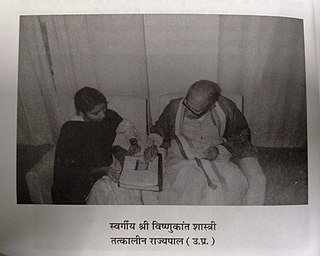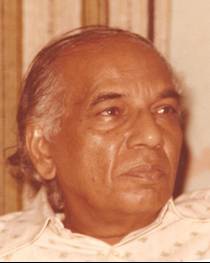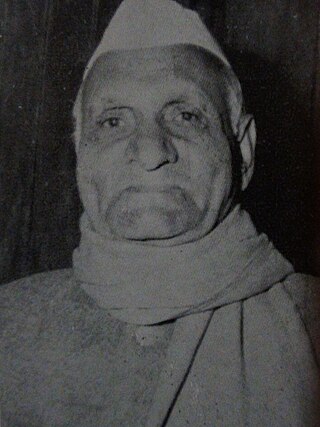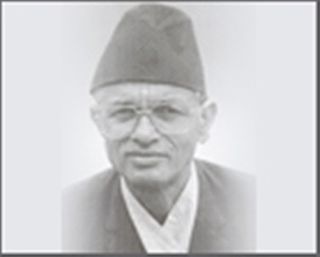Hindi literature includes literature in the various Central Indo-Aryan languages, also known as Hindi, some of which have different writing systems. Earliest forms of Hindi literature are attested in poetry of Apabhraṃśa such as Awadhi and Marwari. Hindi literature is composed in three broad styles- prose, poetry, and prosimetrum. In terms of historical development, it is broadly classified into five prominent forms (genres) based on the date of production. They are:

Maithili Sharan Gupt was one of the most important modern Hindi poets. He is considered one among the pioneers of Khari Boli poetry and wrote in Khari Boli dialect, at a time when most Hindi poets favoured the use of Braj Bhasha dialect. He was a recipient of the third highest Indian civilian honour of Padma Bhushan. For his book Bharat-Bharati (1912), widely quoted during India's freedom struggle, he was given the title of Rashtra Kavi by Mahatma Gandhi.

Sachchidananda Hirananda Vatsyayan, popularly known by his pen name Agyeya, was an Indian writer, poet, novelist, literary critic, journalist, translator and revolutionary in Hindi language. He pioneered modern trends in Hindi poetry, as well as in fiction, criticism and journalism. He is regarded as the pioneer of the Prayogavaad (experimentalism) movement in modern Hindi literature.

Ramdhari Singh, known by his pen name Dinkar, was an Indian Hindi language poet, essayist, freedom fighter, patriot and academic. He emerged as a poet of rebellion as a consequence of his nationalist poetry written in the days before Indian independence. His poetry exuded Veer Rasa, and he has been hailed as a Rashtrakavi and Yuga-Chāraṇa on account of his inspiring patriotic compositions. He was a regular poet of Hindi Kavi Sammelan and is hailed to be as popular and connected to poetry lovers for Hindi speakers as Pushkin for Russians.

The Ramanandi, also known as Ramavats, is one of the largest sects of Vaishnavas. Out of 52 sub-branches of Vaishnavism, divided into four Vaishnava sampradayas, 36 are held by the Ramanandi. The sect mainly emphasizes the worship of Rama, Sita, Hanuman, and the avatars of Vishnu. They consider Rama and Sita as the Supreme Absolute who are not different from each other. It is considered to have been founded by Ramananda, a 14th-century Vaishnava saint.

Vishnu Kant Shastri was an Indian politician who served as the governor of Uttar Pradesh and Himachal Pradesh. He was also an academic, scholar, poet, philosopher, author, critic, orator, editor and administrator.

Bhagalpur, historically known as Champa Nagri, is a city in the Indian state of Bihar, situated on the southern bank of the Ganges river. It is the third largest city of Bihar by population and also serves the headquarters of Bhagalpur district, Bhagalpur division, and Eastern Range. It is known as the Silk City and also listed for development under the Smart Cities Mission by Government of India. It is the only district in Bihar after capital city Patna where three major higher educational institutions IIIT Bhagalpur, Jawaharlal Nehru Medical College, TMBU, and Agriculture University (BAU) are located and also Vikramshila Central University is under construction next to the ruins of the medieval Vikramshila Mahavihara. Bhagalpur Railway Station serves the city. The river around city is home to the Gangetic dolphin, the National Aquatic Animal of India, and the Vikramshila Gangetic Dolphin Sanctuary is established near the town. The city holds the largest Manasa Puja and one of the largest processions in Kali Puja, an intangible cultural heritage of the region.

Amritlal Nagar was one of the prominent Hindi writers of the twentieth century.

Syed Ali Jawad Zaidi was an Indian Urdu poet, scholar, and author of over 80 books in several languages. He was also an Indian independence activist, lawyer and later, a civil servant, but is best known for his work in Urdu literature.
Ram Karan Sharma was a Sanskrit poet and scholar. He was born in 1927, in Shivapur in the Saran district of Bihar.

Maharaja Rao Birender Singh was an Indian politician. He served first as a minister in the state government of Punjab and then as Chief Minister of Haryana, and also served as a minister in Punjab state, Haryana state and the Union cabinet. He also served as the second speaker of Haryana state assembly in 1967. He coined an Indian political vocabulary Aaya Ram, Gaya Ram to describe the practice of frequently floor-crossing by legislature.

Pandit Ram Kishore Shukla was an Indian politician and an activist for Indian independence.

Hari Shankar Sharma (1891–1968) was a Hindi and Urdu poet from Harduaganj, Aligarh, India.
Niaz Fatehpuri (1884–1966) was the pen name of Niyaz Muhammed Khan, a Pakistani Urdu poet, writer, and polemicist. He was also the founder and editor of Nigar. In 1962, he was awarded the Padma Bhushan by the President of India for "Literature and Education."

Tulsiram Sharma 'Kashyap' was an Indian writer and politician in the Nepali language from Sikkim, India. He is a recipient of Sahitya Academy Award in Nepali for his poetry Aama in 1990. He is the second generation writers of modern era of Nepali literature who has contributed to all genres of literature.

Bal Krishna Sharma, known under the pen name Naveen, was an Indian freedom activist, journalist, politician and a poet of Hindi literature. He was a member of the 1st Lok Sabha, representing Kanpur constituency and served the Rajya Sabha as a member from 1957 till his death. He succeeded Ganesh Shankar Vidyarthi as the editor of Pratap daily and also served as a member of the Official Languages Commission. His poetry anthologies include Kumkum, Rashmirekha, Apalak, Kwasi, Vinoba Stavan, Urmila and Hum Vishpaee Janam Ke, the last one published posthumously. The Government of India awarded him the third highest civilian honour of the Padma Bhushan, in 1960, for his contributions to literature. India Post issued a commemorative stamp on Sharma in 1989.

Surender Sharma is an Indian poet, writer and humorist. He often writes and performs comic sketches of himself and his wife and known for his refrain chaar lainaa suna raha hoon in Haryanavi dialect. He was honoured by the Government of India in 2013, with the award of Padma Shri for his contributions to the field of literature.
Brij Kishore Sharma is an Indian former politician.
Avadh Kishore Jadia is a poet and author in the Bundeli language and the Braj language from the Chhatarpur district in the Indian State of Madhya Pradesh. He was also an Ayurveda medical practitioner in the Madhya Pradesh Govt Service. In the year 2022, Govt of India honored him by conferring the Padma Shri award for his contributions as an author in the Bundeli and Braj languages.














